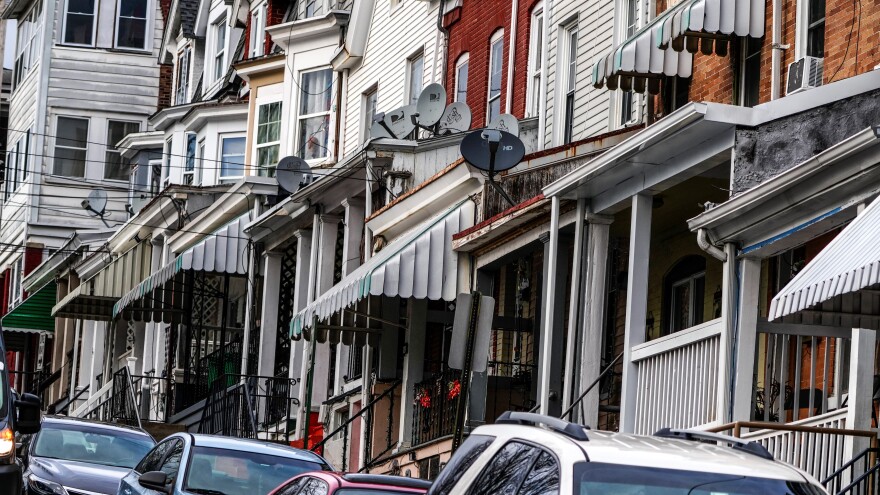ALLENTOWN, Pa. — Allentown officials will commission an in-depth look at the city’s housing situation as they work to develop a comprehensive strategy.
City Council on Wednesday approved a $196,000 contract to conduct a study of the city’s housing stock and related services.
- Reinvestment Fund will lead a study of Allentown’s housing stock and services
- The study will guide the city’s housing plans through 2028
- City Council also approved spending $1 million to support an affordable housing project
The “granular” assessment will help officials develop a strategic plan to guide the city’s housing-related actions through 2028, city Community and Economic Director Vicky Kistler said.
City officials have been “passive” in recent years, waiting for community developers to initiate housing projects, Kistler said.
But “there isn't a line of people” asking Allentown for money to build affordable housing, so the city must create its own housing plan, she said.
The study will examine Allentown on a “neighborhood-by-neighborhood basis” to show officials “where we can try to focus our resources into a neighborhood or a street or a block — or even part of a block — to try to make a significant difference,” Kistler said.
'Using data to understand markets'
Officials will look to bring the city’s housing and zoning ordinances into alignment with findings from the study, which also will include an assessment of community health needs, Kistler said.
Reinvestment Fund was awarded the contract to conduct Allentown’s comprehensive housing study.
The nonprofit, which has offices in Philadelphia, Baltimore and Atlanta, says on its website that it’s a “mission-driven financial institution that creates opportunity for underserved people and places.”
“We use data to understand markets, communities and impediments to opportunity — and how investment and policy decisions can have the most powerful impact,” the organization says.
“We're very much looking forward to delivering the results of this housing strategy [study] to City Council so that we can take action to improve our housing stock.”Allentown Mayor Matt Tuerk
Allentown Mayor Matt Tuerk told council he was “proud to deliver” the contract for its approval and his office is “thrilled with the outcome here.”
“We're very much looking forward to delivering the results of this housing strategy [study] to City Council so that we can take action to improve our housing stock,” he said.
Officials in the city’s community and economic development department hope a substantial part of the study will be completed by the end of 2023.
“We're hoping that we're going to be able to budget based off of the results we get from it,” Kistler said.
'Historic opportunity'
Municipalities that got pandemic-relief money from the American Rescue Plan Act must allocate those funds by the end of 2024. Funds must be spent by Dec. 31, 2026.
Allentown got $57 million in ARPA funding.
That money can be spent to address a range of issues brought on by the COVID-19 pandemic, as well as infrastructure improvements, including housing projects.
“We have an affordable housing crisis in the city of Allentown,” Allentown City Council member Ce-Ce Gerlach recently said.
She was speaking after a meeting at which a committee recommended spending $1 million of the city’s ARPA funds on affordable housing.
“Our housing stock has enormous potential, but instead of investing in it, we are letting it rot. Much of the housing stock is in such disrepair it should be razed.”Allentown resident Alan Jennings
Gerlach said she hopes the seven-figure expenditure is followed by more investments in affordable housing.
“I look forward to spending more money on affordable housing, especially ARPA money, because … it’s such a basic, fundamental need,” she said last month. “Everyone needs a place to live.”
Resident Alan Jennings told council Wednesday that Allentown “desperately” needs a policy to address its housing issues, which he called “the most serious threat” to the city’s future.
Jennings, former executive director of Community Action Lehigh Valley, told council it has a “historic opportunity to turn our neighborhoods around” by funding affordable housing projects.
“Our housing stock has enormous potential, but instead of investing in it, we are letting it rot,” he said. “Much of the housing stock is in such disrepair it should be razed.”
Jennings called on council to spend more of its “tens of millions of dollars” in pandemic-relief funding on housing. He also urged members to create a new source of funding for housing to replace the pandemic-relief money when it’s gone.
Allentown’s housing situation
There were just over 48,700 housing units in Allentown in 2020, according to U.S. Census Bureau data. About 19,000 units are in multi-family structures, while about 29,700 are single-family homes.
Census statistics show 3,562 housing units, or 7.3%, were vacant in 2020. Renters occupied about 58.5% of housing units in Allentown and owners occupied about 41.5%, according to the federal agency.
About 52% of households citywide spend 30% or less of their income on housing — a level considered “affordable” — while about 46% of households have a housing “cost burden,” according to data from Allentown’s five-year consolidated plan, published in March 2020.
But the city's statistics show Hispanic and Black households in Allentown are burdened by housing costs at a much higher rate.
While 63% of white households in Allentown spend 30% or less of their income on housing, just 41% of Hispanic households and 44.6% of Black households have affordable housing costs, the city’s stats show.
A vast majority of Allentown’s housing units — 89% — is considered to be “older,” having been built before 1990, according to the city’s five-year consolidated plan for 2020-24. More than a third of all housing units in the city were built before 1939, the plan states.
A vast majority of Allentown’s housing units — 89% — are considered to be “older,” having been built before 1990, according to the city’s five-year consolidated plan for 2020-24.
More than a third of all housing units in the city were built before 1939, the plan states.
Allentown “does not have much undeveloped land,” though there are opportunities to redevelop several substantial sites, including vacant retail centers and industrial properties, according to the plan.
Affordable housing project approved
City Council unanimously approved a measure to spend $1 million of the city’s pandemic-relief funds to help an affordable housing project get off the ground.
Developers HDC MidAtlantic and the Alliance for Building Communities hope to break ground this summer on a four-story, 49-apartment complex at 1528 W. Hamilton St.
The apartments would include 24 units for residents who earn less than 60% of the area’s median income; 20 units for those earning less than 50%; and five units for those earning less than 20%.
Allentown's area median income was $47,703, according to the Census Bureau's 2021 estimates.
Ten units would be set aside for residents with developmental and intellectual disabilities, according to the developers.
Zoning officials approved the project in January. But developers are asking the city for help with a $1.6 million funding gap after initial costs projections were inflated by the pandemic, labor shortages, interest rate hikes and other issues.
The city will spend $1 million from its American Rescue Plan Act funds, and officials plan to invest an additional $850,000 in federal funding from HUD.
The project on West Hamilton Street also has received $1.2 million in low-income housing tax credits from the Pennsylvania Housing Finance Agency.
HDC officials said they expect to spend about $16 million on the project, which could generate up to triple that amount in economic activity.
The developers are looking to hire local contracts, as well as minority- and women-owned businesses during construction.


